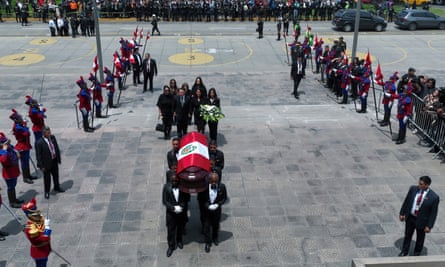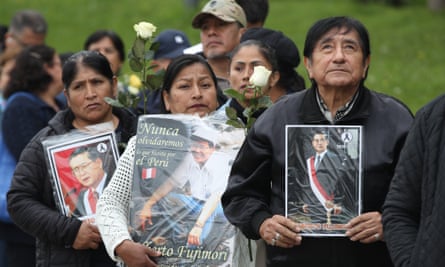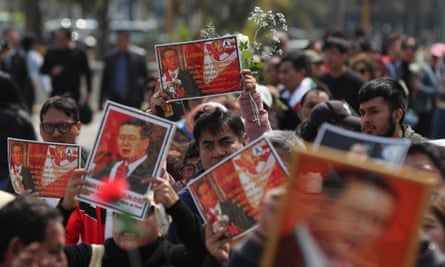https://www.theguardian.com/world/2024/sep/14/transformative-for-better-and-for-worse-whats-the-legacy-of-perus-alberto-fujimori
‘Transformative, for better and for worse’: what’s the legacy of Peru’s Alberto Fujimori
Despite his convictions for corruption and human rights abuses, many see the president who has died at 86 as the country’s greatest leader
At 11.45 on Thursday morning, six white-gloved pallbearers carried a coffin holding the body of the most divisive, beloved and reviled Peruvian politician of the last four decades. They passed the mourners, the cameras and the flag-topped lances of the Húsares de Junín cavalry regiment, and set it down in the hall of Lima’s brutalist culture ministry.
Behind the coffin, holding hands and dressed in black under a pale but warm spring sky, came its occupant’s eldest daughter and youngest son. A crowd of ministers, political allies and military top brass awaited them at the ministry.
And so began three days of national mourning to honour Alberto Fujimori, the political upstart who served as president of Peru from 1990 to 2000 and who, nine years later, was ordered to serve a 25-year sentence for authorising kidnappings and murders during his government’s “war against terrorism”.
On Saturday, after a state funeral at the ministry, supporters gathered as he was buried at the Campo Fe de Huachipa cemetery in the city.
The fact that Fujimori, who died of cancer aged 86 on Wednesday, was afforded the kind of send-off not seen since the 2020 funeral of the Peruvian former UN secretary-general Javier Pérez de Cuéllar may have infuriated many in the South American country, but it came as little surprise.

After all, the life and legacy of Fujimori – who was pardoned and released from prison just 10 months ago – is perhaps the most bitter and disputed topic in contemporary Peru.
結局のところ、わずか10か月前に恩赦を受けて釈放されたフジモリの人生と遺産は、現代のペルーで最も苦々しいものであると当時に議論の的ともなっている話題と言えるでしょう。
To many, he will always be the cynical autocrat whose corruption, hunger for power and disdain for human rights poisoned the nation. To others, he will forever remain the political outsider who came from nowhere but somehow managed to defeat the twin scourges of terrorism and hyperinflation.
Those in the latter camp were evident on the streets outside the culture ministry on Thursday, where they queued, cheered and cried as they reminisced about the man affectionately known as “El Chino”, while floral wreaths sent by the country’s business elite piled up.
“He’s getting the honours he deserves because he was the best president in the history of Peru,” said Milagros Parra, 54, who had come with companions from the San Juan de Lurigancho neighbourhood on the outskirts of Lima.
“He inherited a country full of blood with massive hyperinflation. We have to thank him.”
Her friend Bonifacia Moreno, 79, was also grieving. “Our economy is thanks to him; our peace is thanks to him, she said. “Who will defend us now?”
Fujimori, the son of Japanese immigrants, was the all-but-unknown candidate who ran against the Peruvian novelist – and future Nobel prize-winner – Mario Vargas Llosa in the 1990 election, which was held after almost a decade of the Shining Path’s Maoist terrorism and years of economic upheaval.
With Vargas Llosa perceived as another candidate from the country’s white, Lima-centric elite, Fujimori, an agricultural engineer and mathematician schooled in France and the US, capitalised on his appeal to ordinary Peruvians by riding a tractor and pledging “honesty, technology, work”.
The pitch worked and Fujimori won. His drastic market reforms and deregulation of the Peruvian economy appealed to the business elite, while programmes to build schools, roads and bridges in poor, abandoned communities, won him votes and lifelong support.
As a result, said José Alejandro Godoy, the author of two books about Fujimori, “both wealthy and poor sectors continue to be the main bases of support for him and the political movement he founded”.
But, faced with economic and terrorist turmoil from the outset, Fujimori governed with an increasingly authoritarian hand in connivance with his spymaster, Vladimiro Montesinos, a corrupt lawyer and former soldier who offered him control of the judiciary and the armed forces.
Emboldened by broad public support, Fujimori embarked on the “war against terrorism” that eventually crushed the Shining Path insurgency and then the smaller Tupac Amaru Revolutionary Movement, which made headlines when it took hostages during a party at the Japanese ambassador’s residence in December 1996. The capture in 1992 of the Shining Path’s leader, Abimael Guzmán, proved a major coup – the much-feared terrorist mastermind was paraded in a cage in prison stripes – as did the operation that ended the siege at the Japanese ambassador’s residence in April 1997.
多くの人にとって、フジモリは腐敗、権力欲、人権軽視によって国家を蝕んだ冷酷な独裁者として永遠に記憶されるでしょう。一方で、彼をテロとハイパーインフレという二重の災厄を克服した政治的アウトサイダーとして称える人々もいます。
その後者の人々は、木曜日に文化省の外の通りで見受けられました。彼らは列を作り、声援を送り、涙を流しながら、親しみを込めて「エル・チノ」と呼ばれた彼を思い出していました。一方で、国内の経済界のエリートたちから送られた花輪が次々と積み上げられていました。
「彼はペルーの歴史の中で最高の大統領だったから、ふさわしい敬意を受けているのです」と語るのは、リマ郊外のサン・フアン・デ・ルリガンチョ地区から仲間とともに訪れた54歳のミラグロス・パラです。「彼が引き継いだ国は血にまみれ、大規模なハイパーインフレに苦しんでいました。彼に感謝しなければなりません。」
彼女の友人で79歳のボニファシア・モレノもまた、深い悲しみに沈んでいました。「私たちの経済は彼のおかげです。私たちの平和も彼のおかげです。これから誰が私たちを守ってくれるのでしょう?」
日本移民の子として生まれたフジモリは、ほぼ無名の候補者として1990年の大統領選挙に立候補しました。この選挙は、約10年にわたる毛沢東主義を掲げる「センデロ・ルミノソ(輝ける道)」のテロと経済的混乱の後に行われました。
白人でリマ中心のエリート層に属する候補者と見なされていたペルー人作家で将来のノーベル賞受賞者、マリオ・バルガス・リョサに対抗し、農業技師で数学者のフジモリは、トラクターに乗り「正直、技術、労働」を掲げることで庶民に訴えました。
その訴えが功を奏し、フジモリは勝利しました。彼の過激な市場改革と経済の規制緩和は経済界に受け入れられ、貧困層や見捨てられた地域で学校、道路、橋を建設するプログラムは票と生涯の支持を獲得しました。

Desperate for an end to the bloodshed – the country’s truth and reconciliation commission would later establish that 69,280 people were killed between 1980 and 2000, 54% of them by the Shining Path – many Peruvians supported Fujimori’s “by any means necessary” tactics.
In the early 1990s, Fujimori holed up in the intelligence service headquarters from where he directed a dirty war using a death squad, the Grupo Colina, to carry out massacres for which he was eventually convicted and jailed for 25 years in 2009 in a landmark trial against a former head of state.
These crimes, which included the murder of an eight-year-old boy and a string of other human rights violations, turned a large sector of public opinion against Fujimori, as did increasing revelations of corruption.
But it took time. Even when he dissolved congress in 1992, allied himself with the military and co-opted national institutions to rewrite the constitution, allowing him to run for re-election, he still had broad support. With a chokehold on power, he gutted and corrupted public bodies and, via Montesinos, controlled a significant part of the press that trashed his opponents through tabloids known as the prensa chicha.
“He perfected the use of ‘fake news’ to control and subjugate the population,” said Jo-Marie Burt, professor of political science at George Mason University and a senior fellow at the Washington Office on Latin America.
Things finally began to fall apart towards the end of his second term when he began pushing for a third mandate using much of the apparatus of a co-opted state. Protests against his regime grew until they became daily in Lima and, after an election in 2000 that was beset with allegations of ballot-rigging – and the emergence of videos that showed Montesinos bribing lawmakers with stacks of cash – Peruvians tired of the Fujimori government and its graft.
Soon after, on an official trip to Asia, Fujimori fled to Japan, his parents’ homeland, and resigned the presidency by fax. But Peru’s congress rejected his resignation and, instead, stripped him of the presidency, arguing that he was “morally unfit” to be head of state.
With Fujimori in disgrace and, latterly, in prison, it was left to his daughter, Keiko, who had been his first lady since 1994 when her parents separated, to defend and perpetuate her father’s legacy. Today, Keiko, who has finished second in the past three presidential elections, remains the standard bearer for the political force known, after her father, as fujimorismo – a viciously divisive movement that has contorted Peruvian politics ever since he won power.
Fujimori may be dead, but experts say his shadow lingers – and will continue to do so for a while yet. Hundreds of thousands of women and men – many poor and Indigenous – are still seeking justice after being forcibly sterilised under his presidency.
For Godoy, the late president “degraded Peruvian politics to extremes rarely seen in national history” and can be considered the father of the “competitive authoritarianism” seen today in El Salvador under Nayib Bukele.
血の流れを止めたいと切望していた多くのペルー人は、フジモリの「必要な手段は何でも取る」という戦術を支持しました。1980年から2000年の間に69,280人が殺害され、そのうち54%がセンデロ・ルミノソによるものだったと、後に真実和解委員会が明らかにしました。
1990年代初頭、フジモリは情報機関本部に籠り、死の部隊「コリナ・グループ」を用いた汚い戦争を指揮しました。この部隊による虐殺の数々で、彼は最終的に有罪判決を受け、2009年、国家元首に対する歴史的な裁判で25年の刑を宣告されました。
これらの犯罪には、8歳の少年の殺害やその他一連の人権侵害が含まれており、腐敗の増加する暴露とともに、フジモリへの世論の支持は大きく揺らぎました。
しかし、それには時間がかかりました。1992年に議会を解散し、軍と結託して国家機関を支配し憲法を書き換え再選出馬を可能にした時でさえ、彼は広範な支持を得ていました。権力を掌握した彼は、国家機関を破壊し腐敗させ、モンテシノスを通じて反対派を中傷する「プレンサ・チチャ」と呼ばれるタブロイド紙を用い、多くの報道機関を支配しました。
「彼は“フェイクニュース”を利用して国民を支配し服従させる術を極めた」と、ジョージ・メイソン大学の政治学教授であり、ワシントン・オフィス・オン・ラテンアメリカのシニアフェローであるジョ・マリー・バート教授は述べています。
フジモリの権力は、3期目を目指して国家の仕組みを利用し始めた2期目の終わり頃から崩壊し始めました。抗議運動がリマで日常化し、2000年の選挙で不正疑惑が浮上した後、モンテシノスが議員に賄賂を渡す様子を収めたビデオが公開されると、ペルー国民はフジモリ政府の汚職に飽き飽きするようになりました。
その直後、公式訪問先のアジアでフジモリは日本に逃れ、ファックスで大統領職を辞任しました。しかし、ペルー議会は辞任を拒否し、彼を「国家元首として道徳的に不適格」として大統領職を剥奪しました。

The author Michael Reid describes Fujimori as “a transformative president for better and for worse”.
Although many, unsurprisingly, associate the late president with human rights violations and the poisoning of democracy, Reid points out that “most poorer Peruvians look back on Fujimori as somebody who saved the country and somebody who improved their lives and the economy” during a time of crisis.
But, he added, Fujimori “introduced corruption as an instrument of rule and I think that was immensely damaging … Above all, his legacy, sadly, has been one of dividing Peruvians because he did rule as an autocrat from 1992 to 2000.”
As Peru digs in for the mourning period and the many memories it will stir up, some have noted that, in a quirk of fate, Fujimori died exactly three years to the day after his terrorist nemesis Guzmán died in a military hospital , also at the age of 86.
Some have even dared to imagine that the coincidence might herald a better future for a country desperately in need of a break with its recent past.
“And so Alberto Fujimori dies on the same day as Abimael Guzmán,” the Peruvian writer Santiago Roncagliolo wrote on X. “Let’s hope this is an omen for an era with neither terrorists nor dictators. Let’s hope the universe is saying that Peru can be a democracy.”
作家のマイケル・リードは、フジモリを「良くも悪くも国を変えた大統領」と評しています。
多くの人が、故大統領を人権侵害や民主主義の毒害と結びつけて記憶するのは当然のことですが、リードは「多くの貧しいペルー人にとって、フジモリは国を救い、危機の時代に生活と経済を改善した人物として振り返られている」と指摘します。
しかし彼はまた、「フジモリは腐敗を統治の手段として導入し、それは非常に有害だったと思います…何よりも悲しいことに、彼の遺産はペルー人を分断するものになってしまいました。1992年から2000年にかけて独裁者として統治したからです」と述べています。
ペルーが喪に服し、多くの記憶が呼び起こされる中、フジモリがちょうど3年前の同じ日に、彼の宿敵であったテロリストのアビマエル・グスマンが軍病院で亡くなったこともまた運命のいたずらだと指摘する人もいます。奇しくも、二人とも86歳で亡くなりました。
一部の人々は、この偶然が、近年の過去との決別を切望するペルーにとって、より良い未来の前兆となるのではないかとさえ想像しています。
「こうしてアルベルト・フジモリはアビマエル・グスマンと同じ日に亡くなった」と、ペルー人作家サンティアゴ・ロンカリオーロはX(旧Twitter)に書き込みました。「これがテロリストも独裁者もいない時代の前兆であることを願っています。宇宙がペルーが民主主義になれると告げているのだと信じたい。」
---------------------------- まとめ -----------------------------------
アルベルト・フジモリの遺産について語るとき、その評価は「良くも悪くも国を変えた」という表現が的を射ているでしょう。彼はペルーの近代史において最も物議を醸した政治家の一人であり、彼の統治期間中の功績と失敗は、現在のペルーの政治的・社会的状況に深い影響を及ぼしています。
功績:危機の克服と改革
テロとの戦い: フジモリは、1980年代から1990年代にかけてペルーを揺るがしていた「センデロ・ルミノソ(輝ける道)」や「トゥパク・アマル革命運動」などのテロ組織を鎮圧しました。特に、センデロ・ルミノソの指導者アビマエル・グスマンの逮捕は大きな成果とされています。
経済危機の収束: 彼の市場改革と経済の安定化政策により、1990年代初頭のハイパーインフレを克服しました。この結果、多くの貧困層が経済的改善を実感しました。
インフラ開発: 学校、道路、橋の建設を通じて、長らく放置されてきた地方の貧困地域に貢献しました。これにより、彼は多くの貧しいペルー人の支持を得ました。
問題点:権威主義と腐敗
独裁的統治: 1992年、議会を解散し、軍や情報機関を利用して権力を強化しました。この時期、民主主義は後退し、彼自身の再選を可能にするため憲法を改正しました。
人権侵害: 死の部隊「コリナ・グループ」を利用し、テロとの戦いの名のもとに多くの市民を犠牲にしました。2009年、これらの犯罪で25年の刑を言い渡されています。
腐敗の制度化: 情報操作や「プレンサ・チチャ」と呼ばれるタブロイド紙を利用して反対派を攻撃し、権力基盤を維持しました。また、スキャンダルの象徴ともいえるビデオが公開され、政府の汚職体質が明るみに出ました。
彼の遺産:分断された国民
マイケル・リードが指摘するように、フジモリは「貧しいペルー人にとっては国を救った存在」でありながら、「腐敗を統治の手段として導入し、国民を分断した」人物でもあります。
フジモリが残した影響は現在も続いています。彼の娘ケイコ・フジモリは父の遺産を背負い、政治活動を続けていますが、「フジモリ主義」という運動は依然としてペルー政治を大きく揺るがしています。
未来への期待
フジモリが亡くなり、その同じ日に宿敵であるグスマンも亡くなったという偶然に、一部の人々は新しい時代の前兆を見出しています。「テロリストも独裁者もいない未来」への希望が語られる中、フジモリの遺産がどのように語り継がれ、評価されていくのかが問われています。

